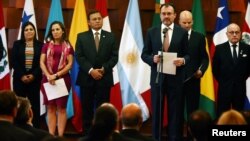The Lima Group of largely Latin American nations on Monday urged the Venezuelan government to suspend the presidential election scheduled for May 20, calling the process “illegitimate and lacking in credibility.”
In a joint statement, Argentina, Brazil, Canada, Chile, Colombia, Guatemala, Honduras, Mexico, Panama, Paraguay, Peru, St. Lucia, Spain and the United States condemned Venezuela’s government and vowed to consider steps if the vote went ahead.
The countries, not all of which belong formally to the group established last year in Lima to address the crisis in Venezuela, said they had analyzed possible scenarios and identified a series of “actions” they could take.They did not provide details on what those might be.
Venezuela's main opposition coalition is boycotting the election, saying it is a farce intended to legitimize a “dictatorship” led by President Nicolas Maduro.
Maduro’s main opposition rivals are barred from standing, and most Venezuelans regard the election board as answerable to Maduro.
Foreign and finance ministers from most of the countries in the Lima Group met in Mexico City and said they would consider steps to be taken either individually or collectively at a diplomatic, economic, financial or humanitarian level.
“The (Lima Group) is making a final call to the Venezuelan government to suspend the general elections planned for May 20, as they have been called by an illegitimate authority," Mexican Foreign Minister Luis Videgaray said, reading the statement.
The statement cast Maduro's government as “authoritarian.”
U.S. Secretary of State Mike Pompeo urged Lima Group members to block Venezuelan leaders from using their financial systems and to bar entry to their countries, the State Department said in a statement.
Last week, the U.S. government unveiled fresh sanctions and urged more nations to increase pressure on Caracas.
U.S. President Donald Trump's administration blames Maduro for a deep recession and hyperinflation that have caused food shortages in Venezuela and prompted many residents to leave.
Peru’s foreign minister Nestor Popolizio told a news conference that there were now more than 200,000 Venezuelans in his country, while his Argentine counterpart Jorge Faurie saidthat there were in excess of 90,000 in Argentina.
Brazil and Colombia have seen large influxes of Venezuelans crossing their borders in recent months.





